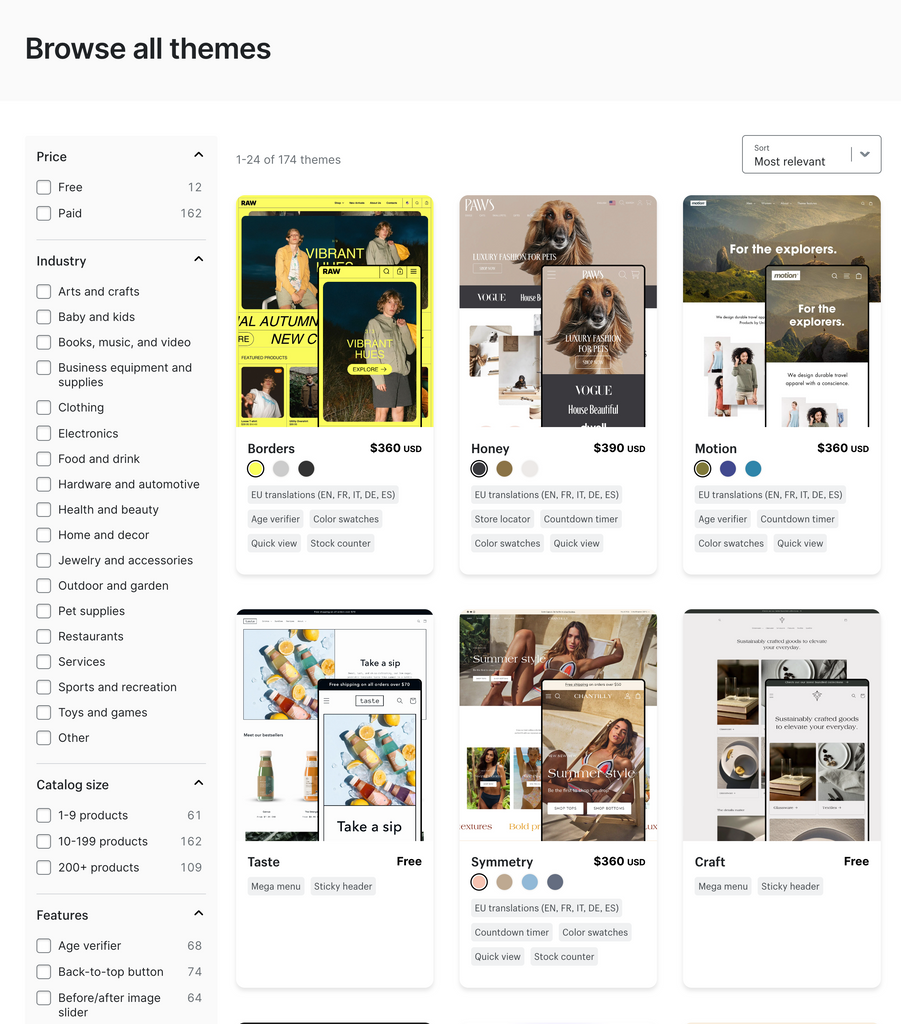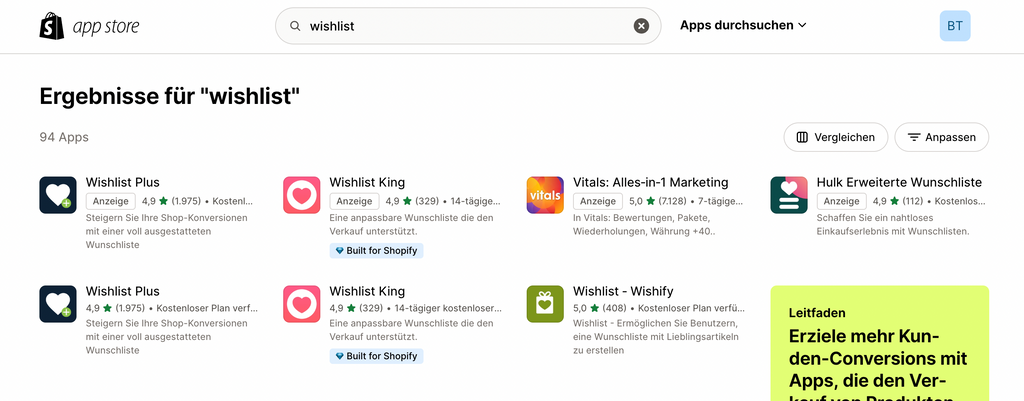Your own online shop depends on the right shop system. You may be wondering whether you should run your shop with Strato or Shopify. Or you may have already decided on a provider but would like to know if another system offers more advantages.
Our comprehensive comparison will help you choose between Strato and Shopify. E-commerce expert Adrian compares the most important aspects of the two store systems, such as features and costs. This way, you can choose the provider that best suits your needs right from the start or find out when the right time to migrate is.
Before we begin the comparison, a personal note: We are a Shopify agency and therefore naturally have a preference. Nevertheless, we strive to provide an honest and as neutral a comparison as possible between the two e-commerce systems.

- What is Shopify?
- What is Strato?
-
Strato or Shopify? 13 important aspects
- Cloud hosting & automatic updates on both systems
- More vulnerable vs. powerful servers
- Easy entry into both systems
- Small design selection vs. huge theme catalog
- +30 apps vs. ecosystem of 8,000 apps
- Native wishlist function vs. wishlists via apps
- Tariff-based vs. unrestricted payment methods
- Tariff-bound vs. tariff-independent marketplaces
- Limited vs. comprehensive social media integration
- Multiple domains included vs. paid additional domains
- Limited vs. unlimited number of products
- Cumbersome vs. native omnichannel integration
- Limited vs. 24/7 support
- Cost comparison
- Conclusion: The decision between the shop systems
1. What is Shopify?
Shopify is an established, cloud-based e-commerce platform headquartered in Canada. It allows retailers to easily create and manage an online store without any programming knowledge. Shopify handles hosting and provides users with its professional IT infrastructure.
4.8 million online stores in 175 countries already use Shopify as their e-commerce platform. These include international brands such as Pepsi, Fenty Beauty, and Gymshark, as well as well-known German brands such as SNOCKS, Hey Marly, and PURELEI.
Get started on Shopify - with our guides & checklists 🚀
2. What is Strato?
Unlike Shopify, Strato isn't a pure e-commerce platform. In addition to online shops, it also offers hosting for all kinds of other websites. Additional services include domains, servers, and cloud storage.
As a provider based in Berlin, Strato is particularly well known in German-speaking and Dutch countries.
3. Strato or Shopify? 13 aspects you should consider
a. Cloud hosting & automatic updates on both systems
With both Strato and Shopify, you benefit from the advantages of a cloud-based online store. Both platforms provide you with their proven servers, so you don't have to worry about technical setup and hosting yourself.
Another advantage: Updates, security patches, and maintenance are carried out automatically, without any additional effort or costs. Strato and Shopify ensure that your online shop always stays up to date, while you can focus on what matters most: promoting and marketing your products.
b. More vulnerable vs. powerful servers
With Shopify, in particular, you can rely on highly available servers, which even the biggest brands around the globe use. Our experience confirms this: With an impressive uptime of 99.99%, your store will run stably and reliably even during high traffic, for example, during special advertising campaigns or TV appearances.
Compared to the industry average, Strato's loading times are only average. While smaller online shops don't experience any issues, customers with particularly high-performance websites report frequent overloads. We therefore recommend the proven and robust Shopify servers for online shops that process large amounts of data (e.g., through video content, high-resolution graphics, or an extensive product catalog).
c. Easy entry into both systems
Since both platforms take care of the entire technical setup, you can start designing your store immediately after setup. Both Strato and Shopify follow a no-code approach.
Using an intuitive modular system, you can customize the look and feel of your store as you wish and add products in just a few clicks. You don't need any programming knowledge to do this.
At Shopify, we often see how enthusiastic our merchants are about the powerful yet intuitive theme editor. Drag and drop sections allow you to place and configure them as desired in seconds. This ensures that your online store accurately reflects your brand identity and provides shoppers with comprehensive context about your products.
d. Small design selection vs. huge theme catalog
An optimal customer experience requires a visually appealing and compelling appearance for your store. Strato and Shopify conveniently offer design templates for this. These determine the basic layout and look of your online store. They can be installed and customized in just a few steps. However, the options offered by the different store systems vary considerably:
Shopify makes it as easy as possible for you to create an online store that looks great and fits your brand, even without in-depth design knowledge. In the Theme Store, you're guaranteed to find the perfect theme for you among 120 designs. Shopify has a high quality standard: Non-responsive or low-performance designs aren't even included in the catalog.

In just a few clicks, you can then personalize your chosen theme (e.g., font, color, or logos). Just as easily, you can expand your store with diverse content sections such as social media previews, lookbooks, or FAQ sections. Each theme has its own unique features. Even the free themes meet the highest standards and provide an optimal foundation for your Shopify store.
What are the best Shopify themes ? You can find our recommendations on the blog.
While Strato offers around 130 design templates for websites in general, only 30 are suitable for implementing modern online shops. Since the selection is significantly smaller, you'll have to be more willing to compromise if the themes offered don't exactly match your needs.
At Shopify, specialized designers and developers are constantly working to implement state-of-the-art themes according to current standards. Since Strato doesn't just focus on online shops but offers designs for all kinds of websites, it often lags behind in terms of current trends and contemporary looks.
e. Selection of +30 apps vs. ecosystem of 8,000 apps
One of Shopify's unique selling points, which we repeatedly discuss with merchants, is the platform's comprehensive ecosystem of apps and extensions. With over 8,000 available apps, Shopify not only has the largest selection in the entire e-commerce space, but in the App Store, you'll find extensions for virtually every area, from accounting to newsletters, product reviews, and multilingual support.

But the most exciting thing is how seamlessly these different apps interact, exchanging and synchronizing data. This allows you to map exactly the functions your store needs through a customized interaction of various extensions.
Thanks to the huge selection, you have the freedom to choose exactly the apps that best fit your online store. The catalog is constantly growing, as many developers now even prioritize a Shopify-first approach.
In contrast to Shopify, Strato offers a much smaller selection of around 30 apps. While you'll find the absolute essentials, such as shipping, marketing, or newsletters, it lacks advanced features and, above all, alternatives if you're dissatisfied with an app.
Strato apps are also tied to a specific plan. Popular extensions like Billbee for inventory management or the ERP system Xentral are only available with the more expensive plans.
Shopify is clearly superior to Strato when it comes to implementing specific requirements and offering maximum flexibility in shop design.
We show you which apps are essential for your online shop in our overview of the best Shopify apps .
f. Native wishlist function vs. wishlists via apps
Wish lists are an important element for effectively increasing customer loyalty in shops with a broad product catalog, as they allow customers to purchase saved products at a later date. Strato offers retailers a natively integrated wish list feature for this purpose.
In Shopify, on the other hand, you can add wish lists to your online store using a dedicated app. This example clearly illustrates the diverse possibilities Shopify offers: In the App Store, you'll find a selection of around 100 different extensions for exactly this function.
You can decide: Is a pure wishlist app sufficient for you, or is a notification function important to you, for example? With the numerous options, you're sure to find the application that perfectly meets your needs.

You can find out everything about wishlist apps and our personal recommendations in our blog.
g. Tariff-based vs. unrestricted payment methods
It's one of the most common reasons for abandoned shopping carts: Customers miss their preferred payment method during checkout and therefore decide against making a purchase. With a wide selection of payment methods, you're definitely on the safe side.
Strato and Shopify differ significantly in the availability of payment methods. With Strato, the payment methods you can offer at checkout depend largely on the chosen plan. The cheapest package only offers PayPal, purchase on account, and cash on delivery.
Additional payment methods such as credit card or Apple Pay can be added via the external service provider Mollie, but this is only activated in the more expensive Plus plan.
With Shopify, you have no restrictions, even with the cheapest package: Shopify's own payment gateway, Shopify Payments, offers you the most important payment methods, including credit card, Klarna invoice, SOFORTÜberweisung, Apple Pay, Google Pay, and many more.
You can easily integrate these into your online shop without relying on third-party providers, enabling a seamless checkout experience for your customers. Merchants with an international target audience in particular benefit from Shopify Payments and its local payment methods. If you end up missing a payment method, you can easily add it via the app.
You can find out all further details about Shopify Payments in our detailed guide.
h. Tariff-bound vs. tariff-independent marketplaces
With Shopify, you're right where your customers are. Even with the Basic plan, you can easily sync your products with major marketplaces like Amazon, eBay, or Instagram Shopping. It's never been easier to have a cross-channel presence and build your brand awareness.
As with payment methods, with Strato you are significantly dependent on the pricing plan you choose. The Basic plan doesn't include access to marketplaces. The most important channels, Amazon and eBay, are only added to the second-most expensive Pro plan. However, since smaller retailers in particular benefit from the additional exposure offered by marketplaces, Shopify clearly has the advantage over Strato in our view.
j. Multiple domains included vs. paid additional domains
Strato's cheapest plan already includes two domains for your online shop. Higher plans include 3-8 domains. Strato lets you choose from a wide range of domains, such as .de, .com, or .net.
Shopify includes a standard domain ending in myshopify.com and custom marketplace domains (e.g., .de, .at, .uk). Additional domains, however, are not included in the price. However, there are numerous affordable offers from Shopify itself and other service providers.
k. Limited vs. unlimited number of products
Do you have a particularly extensive or fragmented product catalog? With Shopify, worrying about exceeding a certain product limit in your online store is a thing of the past. Since there's no upper limit, you could theoretically create and sell an infinite number of products.
Things are different with Strato: Each plan includes a maximum number of products that can be added. The cheapest plan, for example, includes 500 products. If you exceed this limit, you'll have to upgrade. Therefore, if you prioritize absolute freedom regarding the number of products, we recommend Shopify.
When it comes to product variations, Strato currently has the edge: Each plan allows up to 500 variations per product. However, Shopify has already announced that it will increase the current limit from 100 to 2,000. In our experience, this limitation is only relevant for retailers with particularly high product configuration requirements, for example, in the interior design sector.
l. Cumbersome vs. native omnichannel integration
Shopify understands that your focus is on selling and promoting your products. To reach your target audience, physical sales channels such as brick-and-mortar stores, pop-up stores, or trade show appearances are often relevant.
With Shopify POS (point of sale), you have access to an advanced POS system with every plan. This allows you to easily combine digital and physical sales channels and manage all sales centrally in a single backend. In our opinion, implementing a cross-channel customer journey has never been easier.
So, if you want to effectively combine online and offline commerce, Shopify offers a decisive advantage. However, with Strato, such POS integration isn't as easy: You have to expect more restrictions and greater effort due to the dependence on third-party providers.
You can learn more about Shopify POS in our guide.
m. Limited vs. 24/7 support
When problems arise with your online store, every second counts: If your system fails at short notice, it not only causes frustration for customers but can also lead to significant revenue losses. Therefore, appropriate support is all the more important to help you quickly identify and resolve problems and error sources.
Shopify offers 24/7 customer support, even on its cheapest plan. You can reach the support team around the clock via chat, email, or phone and receive emergency assistance.
Strato, on the other hand, only offers a 24/7 hotline for users of the most expensive plan. With all other plans, you're completely on your own if you encounter problems. Furthermore, many Strato customers complain about the quality and wait times of support for urgent technical issues.
Since bugs and outages have serious consequences, especially in e-commerce, and require immediate action, this point clearly goes to Shopify.
4. Costs of Strato and Shopify compared
A crucial factor in your decision between Strato and Shopify is the question of which e-commerce platform is more cost-effective. We'll provide you with a detailed overview of the monthly costs you can expect with Strato and Shopify, and assess their value for money.
a. Prices Strato
| basic | 16€/month (+15€ setup fee) | 15€/month (annual billing) | Entry-level plan with limited payment methods, no tracking, limited apps & designs, no marketplaces, no multilingual support, 100 GB storage, 2 domains |
| Plus | 33€/month (+15€ setup fee) | 30€/month (annual billing) | Advanced payment methods, limited apps, no marketplaces, no multilingual support, 150 GB storage, 3 domains |
| Per | 44€/month (+15€ setup fee) | 40€/month (annual billing) | Marketplaces & multilingualism included, 200 GB storage, 4 domains |
| Ultimate | 82€/month (+15€ setup fee) | 75€/month (annual billing) | 350 GB storage |
b. Shopify Prices
| Shopify Basic | 36€/month | 27€/month (annual billing) | Entry-level plan for small businesses and individuals, marketplaces |
| Shopify | 105€/month | 79€/month (annual billing) | Rapidly growing small and medium-sized enterprises |
| Shopify Advanced | 384€/month | 289€/month (annual billing) | Large companies |
| Shopify Plus | From $2,500/month (custom offer) | From $2,500/month (custom offer) | Shopify Enterprise Edition with B2B requirements |
Included in every tariff:
- All payment methods (Shopify Payments)
- Marketplaces & social media channels
- Multilingualism
- App ecosystem (+8,000) & modern themes (+120)
- Shopify POS for offline commerce
No matter which Shopify plan you choose, even the cheapest plans offer considerable flexibility in store design and the platform's most important features. The differences lie more in specific features, such as the depth of reporting, the number of employee accounts, or automation.
You can find an overview of all Shopify pricing plans, including further decision-making assistance, in our blog.
c. Strato vs Shopify: Who offers better value for money?
At first glance, Strato's plans appear to be cheaper overall, but Shopify offers more features for the same price: Even the Shopify Basic plan (€36/month) far exceeds the scope of Strato's Plus plan (€33/month) and offers you maximum flexibility.
This includes full access to the largest ecosystem of apps and themes in e-commerce, comprehensive multilingualism, and the inclusion of all marketplaces.
The cheapest Strato plan (€16/month) may seem attractive at first, but if you're a full-time e-commerce entrepreneur and want to grow your store, you'll quickly reach your limits due to the limitations, especially regarding payment methods and apps.
Overall, features that are essential to Shopify and already included in the cheapest plan are only available in more expensive packages with Strato. And even in the most expensive plan, we consider Shopify's range of features to be significantly broader than Strato's.
5. Conclusion: The decision between the shop systems
a. Who is Strato suitable for?
With Strato, you can create a simple online shop in just a few steps and benefit from the advantages of cloud hosting, multiple domains, and affordable prices. If you're more interested in e-commerce as a hobby or are just taking your first steps with your own online shop, we believe Strato could be the right solution for you.
However, full-time retailers who want to grow and expand their store quickly reach their limits with Strato. The expansion and design options are noticeably more limited than with Shopify. Internationalization and multichannel integration are also only available in expensive packages, and even then, they fall short of Shopify's capabilities.
Furthermore, Strato does not offer an enterprise tariff and is therefore less suitable for large companies with complex requirements.
b. Who is Shopify suitable for?
We recommend Shopify if, in addition to user-friendliness, flexible customization options are important to you. Thanks to modern design templates and a professional theme editor, you can represent your brand in your online store exactly as you wish.
Through the perfect interplay of professional and powerful apps, you can map out exactly the features your online shop needs. You offer your customers a holistic customer experience regardless of the chosen pricing plan, and with marketplaces and POS functions, you can even extend your online shop beyond your existing store.
Whether you're an individual or a large company with an international audience, Shopify's scalable e-commerce platform is ideal for retailers of all sizes. The platform grows step by step with your brand and can be flexibly expanded. The Shopify Plus plan also covers even the highest enterprise requirements.
If you want to run e-commerce professionally and expand sustainably, possibly even beyond the German-speaking region, Shopify is, in our opinion, clearly the better choice than Strato.
c. How the migration works
Do you already run an online shop with Strato, but have found that Shopify is a better fit for your goals and requirements?
Migrating between store systems requires detailed planning and technical analysis. We therefore recommend working with specialized experts.
At tante-e, we have many years of experience migrating various e-commerce systems to Shopify. You can learn more about our approach and key learnings in our Shopify Migration Guide.



i. Limited vs. comprehensive social media integration
Both Strato and Shopify include links to social media channels like Instagram, Facebook, and Pinterest. Shopify also allows integration with Snapchat and TikTok. This may be particularly interesting for you if you serve a younger target audience with your online store.
We show you how easy it is to connect social media and Shopify in the tutorial on connecting Instagram to your online shop.